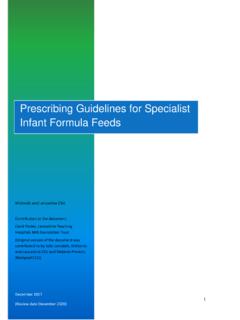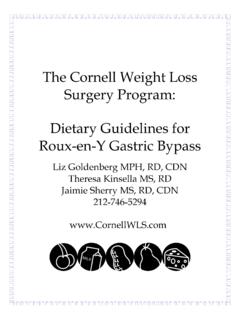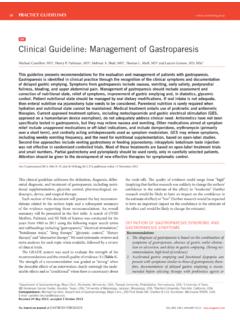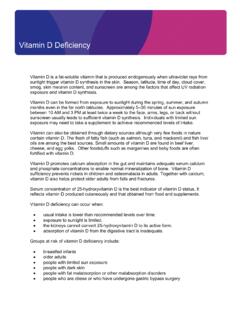Transcription of Guidelines for the prescribing of nutritional …
1 1 Produced: March 2017 Midlands and Lancashire CSU Review Date: March 2020 Guidelines for the prescribing of nutritional supplements post bariatric surgery prescribing recommendations: NHS patients should be directed to purchase nutritional supplements over the counter (OTC) post - bariatric surgery if they have had an adjustable gastric band fitted or sleeve gastrectomy (postoperative risk of impaired absorption is low) LMMG RAG status Black NHS patients should be prescribed nutritional supplements post - surgery if they have received a gastric bypass (Roux-en-Y; postoperative risk of impaired absorption is high) LMMG RAG status Amber0 Patients that have proceeded with bariatric surgery privately do not qualify for NHS continuing care in accordance with this policy LMMG RAG status Black (all preparations) 1. Introduction The incidence of obesity and associated comorbidities continues to increase, with around 8,500 bariatric surgeries performed each year [1].
2 This procedure is now an increasingly routine option for the treatment of obesity in patients with a Body Mass Index of 40 kg/m or more, or between 35 kg/m and 40 kg/m with co-morbidity. Many patients presenting for surgery may have pre-existing low blood vitamin concentrations. All bariatric surgical procedures compromise nutrition to varying extents, with the potential to cause clinically significant micronutrient deficiencies. The British Obesity & Metabolic surgery Society (BOMSS) published its Guidelines in 2014, which make recommendations for the peri-operative biochemical monitoring and micronutrient replacement for bariatric surgery patients [2]. Patients who had their procedure carried out under the NHS will be reviewed by specialist services for two years post - surgery . The Royal College of General Practitioners Nutrition Group have also developed Guidelines which are aimed at all non-specialist clinicians, dietitians and nurses, to aid 2 Produced: March 2017 Midlands and Lancashire CSU Review Date: March 2020 management of these patients once they are discharged back to primary care for whom follow up guidance by the surgical team was not issued [3].
3 2. Preoperative Care All patients should have a comprehensive nutritional assessment prior to bariatric surgery , which includes a detailed dietary assessment by a trained dietitian with specific experience of bariatric nutrition, screening for eating disorders and psychosocial assessment (in accordance with local commissioning arrangements). nutritional deficiencies identified at this stage should be investigated and corrected as clinically indicated, by the specialist bariatric service, prior to surgery (see Table 1). Full Blood Count Parathyroid Hormone Urea and Electrolytes Calcium Liver Function Tests Vitamin D Ferritin Fasting Blood Glucose Folate HbA1c Vitamin B12 Lipid Profile Table 1: Recommended preoperative blood tests before undergoing bariatric surgery [4] Many centres recommend a low calorie / low carbohydrate diet immediately prior to surgery to shrink the size of the liver. A multivitamin and mineral supplement may also be needed as the prescribed diet may not always be nutritionally complete.
4 3. Postoperative Care and Biochemical Monitoring The main bariatric surgeries are: gastric band, gastric bypass (Roux-en-Y) and sleeve gastrectomy, with the duodenal switch being less frequent. Recommendations for postoperative supplementation vary in accordance with the type of procedure: 3 Produced: March 2017 Midlands and Lancashire CSU Review Date: March 2020 * Forceval is the only complete multivitamin and mineral supplement available both on and off prescription. Forceval is available in both soluble and capsule form. Other A to Z multivitamins and minerals are also available to buy perhaps at a lower price. However, it cannot be guaranteed that these contain everything that is required. Table 2: Recommended nutritional supplements after different bariatric procedures [4] Generally, in the initial stages after surgery , patients are advised to start on a liquid diet, before progressing onto pureed food, soft food and then more normal textured food.
5 At two years, the patient should be able to manage a wide range of textures of foods but may still report difficulties with some. It can be assumed that all are not receiving the benefits of eating a well-balanced diet to a greater or lesser extent depending on the type of surgery they have had. Therefore, life-long supplementation is indicated in all patients. Hence, blood monitoring should be performed at intervals that are dependent on the type of bariatric surgery performed (see Table 3) or as directed by the specialist bariatric nutritional supplement Procedure Product Example OTC Cost (per month [MIMS Dec 16]) Dosage Course Length Laparoscopic Adjustable Gastric Band (the patient must be advised to purchase Forceval OTC) Laparoscopic Sleeve Gastrectomy (the patient must be advised to purchase Forceval , Iron and Calcichew D3 Forte OTC. Vitamin B12 will need to be prescribed and administered in primary care) Roux-en-Y Gastric Bypass (prescribe all preparations)
6 Multivitamin and Mineral Yes Yes Yes Forceval * One daily Lifelong Iron No Yes Yes Ferrous Sulphate 200mg once daily Lifelong Ferrous Fumarate 210mg once daily Ferrous Gluconate 300mg once daily Folate Separate preparation is not required - Included in Forceval * Separate preparation is not required - Included in Forceval * Separate preparation is not required - Included in Forceval * Forceval * One daily Vitamin B12 No Yes Yes Hydroxocobalamin - 1mg every 3-months Lifelong Calcium and Vitamin D No Yes Yes Calcichew D3 Forte Three times daily Lifelong Zinc Separate preparation is not required - Included in Forceval * Separate preparation is not required - Included in Forceval * Separate preparation is not required - Included in Forceval * Forceval * One daily Copper Separate preparation is not required - Included in Forceval * Separate preparation is not required - Included in Forceval * Separate preparation is not required - Included in Forceval * Forceval * One daily Selenium Separate preparation is not required - Included in Forceval * Separate preparation is not required - Included in Forceval * Separate preparation is not required - Included in Forceval * Forceval * One daily 4 Produced: March 2017 Midlands and Lancashire CSU Review Date: March 2020 service.
7 The specialist bariatric centre will be responsible for blood monitoring for the first two years post bariatric surgery . Primary care is expected to take responsibility for monitoring bloods annually after this initial period. 5 Produced: March 2017 Midlands and Lancashire CSU Review Date: March 2020 Blood Test Procedure Laparoscopic Adjustable Gastric Band Laparoscopic Sleeve Gastrectomy Roux-en-Y Gastric Bypass Calcium Annually 3, 6, 12 months after surgery , then annually 3, 6, 12 months after surgery , then annually Ferritin N/A 3, 6, 12 months after surgery , then annually 3, 6, 12 months after surgery , then annually Folate N/A 3, 6, 12 months after surgery , then annually 3, 6, 12 months after surgery , then annually Full Blood Count Annually 3, 6, 12 months after surgery , then annually 3, 6, 12 months after surgery , then annually HbA1c or Fasting Blood Glucose (patients with preoperative diabetes) Monitor as appropriate Monitor as appropriate Monitor as appropriate Lipid Profile Monitor in those with dyslipidaemia Monitor in those with dyslipidaemia Monitor in those with dyslipidaemia Liver Function Tests Annually 3, 6, 12 months after surgery , then annually 3, 6, 12 months after surgery , then annually Parathyroid Hormone N/A 3, 6, 12 months after surgery , then annually 3, 6, 12 months after surgery , then annually Selenium N/A If clinically indicated* If clinically indicated* Thiamine N/A Routine blood monitoring is not required only in patients with prolonged vomiting Routine blood monitoring is not required only in patients with prolonged vomiting Urea and Electrolytes Annually 3, 6, 12 months after surgery , then annually 3, 6, 12 months after surgery .
8 Then annually Vitamin A N/A Measure if concerns regarding steatorrhea or symptoms of vitamin A deficiency night blindness Measure if concerns regarding steatorrhea or symptoms of vitamin A deficiency night blindness Vitamin B12 N/A 6, 12 months after surgery , then annually not required if the patient is receiving B12 injections 6, 12 months after surgery , then annually not required if the patient is receiving B12 injections Vitamin D Manage patients in line with the LMMG vitamin D position statement 3, 6, 12 months after surgery , then annually 3, 6, 12 months after surgery , then annually Vitamin E and K N/A If clinically indicated* Measure vitamin E if unexplained anaemia, neuropathy. Consider measuring INR if excessive bruising / coagulopathy Zinc, Copper N/A If clinically indicated* Annually * GP to be informed by the specialist service if indicated. Table 3: Recommended schedules of blood monitoring after different bariatric procedures [5] [2].
9 The specialist bariatric centre will be responsible for blood monitoring for the first two years post bariatric surgery . Primary care is expected to take responsibility for monitoring bloods annually after this initial period. 6 Produced: March 2017 Midlands and Lancashire CSU Review Date: March 2020 4. nutritional Deficiencies What to Look For Clinicians should also be aware of the signs and symptoms of potential nutritional deficiencies especially anaemia, vitamin D deficiency, protein malnutrition, as well as other vitamin and micronutrient deficiencies (see Table 4). Protein Malnutrition can occur for a number of reasons including poor dietary choice, an overtight gastric band, anastomotic or protein malabsorption. It may present several years following surgery . Protein energy malnutrition is accompanied by oedema. In all cases of suspected protein malnutrition, the patient must be fast-tracked back to the bariatric centre. 7 Produced: March 2017 Midlands and Lancashire CSU Review Date.
10 March 2020 nutritional Deficiency Notes Protein malnutrition May present as oedema several years post - surgery Requires urgent referral back to the bariatric team Anaemia Iron deficiency (rule out and investigate other potential causes, such as blood loss) Folate deficiency Vitamin B12 deficiency Less common deficiencies such as zinc, copper, and selenium are a potential cause of unexplained anaemia Some patients may need parenteral iron or blood transfusions if oral iron does not correct the deficiency Calcium and vitamin D deficiency May result in secondary hyperparathyroidism (it is recommended that vitamin D should be replaced as per LMMG guidance) Vitamin A deficiency Suspect in patients with changes in night vision Patients with steatorrhea or those who have had a duodenal switch are at high risk Zinc, copper and selenium deficiency Unexplained anaemia, poor wound healing, hair loss, neutropenia, peripheral neuropathy and cardiomyopathy are potential symptoms Ask about over-the-counter supplements and liaise with bariatric unit, as zinc supplements can induce copper deficiency and vice versa Thiamine deficiency Suspect in patients with poor intake, persistent regurgitation or vomiting This may be caused by anastomotic stricture in the early postoperative phase, food intolerances or an over tight band Start thiamine supplementation immediately and refer urgently to the local bariatric unit due to brisk of Wernicke's encephalopathy Do not give sugary drinks as they may precipitate Wernicke's encephalopathy Table 4.











